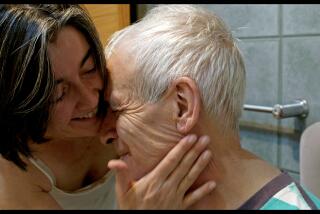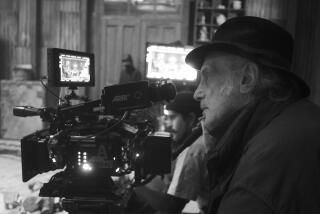Documentary filmmaker and social activist Lourdes Portillo dies at 80

Influential documentary filmmaker Lourdes Portillo, who used her art as social activism to illuminate the struggles of the working class, has died.
The Mexico native, who made “The Devil Never Sleeps” in 1994, and received an Oscar-nomination for her 1985 film, “The Mothers of the Plaza de Mayo,” died Saturday morning at her home in San Francisco, according to her friend and fellow filmmaker Soco Aguilar.
For the record:
10:40 a.m. April 23, 2024An earlier version of this article said Lourdes Portillo died of pancreatic cancer. The filmmaker was diagnosed with cholangiocarcinoma, also known as bile duct cancer.
Portillo, who had been diagnosed with cholangiocarcinoma, also known as bile duct cancer, was 80.
“She was a trailblazer — even up to the last minute,” Aguilar said in an interview. “She was very strong — she was a warrior — and she was completely at peace and happy about all that she had done in her life.”
Just last year, the Academy Museum of Motion Pictures paid tribute to Portillo with a retrospective and gallery to celebrate her life and groundbreaking career. Portillo focused most on issues affecting women in her native Mexico and beyond. In “The Mothers of the Plaza de Mayo,” she elevated the cause of a group of Argentine women who regularly convened at a plaza in Buenos Aires to remember the children who disappeared during that country’s political strife in the late 1970s and early 1980s.
“The Devil Never Sleeps” was about the mysterious murder of her uncle, Oscar Ruiz Almeida, in her home state of Chihuahua.
Lourdes Portillo’s elegiac “Senorita Extraviada” documents with low-key persistence the conditions in Ciudad Juarez that make some say, “There is no better place in the world to kill a young woman.”
Her documentaries sometimes took the form of journalism. Occasionally, her work was controversial.
Among her films were “The Days of the Dead” (1989); “Corpus: A Home Movie for Selena” (1999), about the life and legacy of slain Tejano singer Selena Quintanilla; and “Señorita Extraviada” (2001), a documentary about the disappearance of young women in Ciudad Juárez, Mexico, a film that was honored with a Special Jury Prize at the Sundance Film Festival.
She had been working on a final project with performance artist Guillermo Gómez-Peña in San Francisco.
Portillo was born in Chihuahua, Mexico, in 1943.
Beginning in the third grade, her parents sent her across the border into the U.S. to attend Catholic School. When she was in her teens, her family moved to Los Angeles. She got her start in the film world at the age of 21, when a friend asked her to help with a documentary.
“The reality of living in the United States as an immigrant, it’s very painful, because the first thing that happens to you is that you realize that everybody’s trying to crush your sense of ‘can do,’” Portillo told the Academy Museum in an interview last year. “Your sense of really being important in this society, having something to say. You’re already diminished.”
She moved to San Francisco in the 1970s, where she joined that city’s burgeoning art community. She landed a job as a first-camera assistant while part of a collective called Cine Manifest. In 1978, she graduated from the San Francisco Art Institute.
“That was the beginning of thinking that I could make films that could actually move people to do something that would be good for everybody,” she said during the Academy Museum interview.
With funds from the American Film Institute Independent Filmmaker Award, she went on to make the short documentary “After the Earthquake,” about a Nicaraguan refugee in San Francisco, followed by her more notable films.
“She was strong and she knew what she wanted to say … talking about difficult situations with such an artistry,” Aguilar said. “She was an activist in the way she crafted her films, and that made her extraordinary. She was ahead of her time.”
She is survived by three children, four siblings, five grandchildren and extended family in the U.S. and Mexico..
More to Read
Inside the business of entertainment
The Wide Shot brings you news, analysis and insights on everything from streaming wars to production — and what it all means for the future.
You may occasionally receive promotional content from the Los Angeles Times.







